It’s another busy week for CKHH in that on Monday one of the Kent History Postgraduates stepped in at the last minute to provide a presentation for the Kent Archives lunchtime lectures series organised by Dr Mark Bateson, then on Thursday the Lossenham wills group will be meeting online, and that evening Dr Jay Ingate (subject lead for Archaeology at CCCU) is giving a FCAT/CKHH lecture, on Friday it is the opening of the Brook Rural Museum exhibition on Hop-picking in Kent at the Templeman Library Special Collections at the University of Kent and finally I’m leading two Canterbury Festival walks at the weekend. Furthermore, the Tudors & Stuarts History Weekend 2025 programme is now complete – see below as ‘save the dates’ and just a few previews of what will be on offer from our great line-up of distinguished experts.
However, before that I want to bring you Jason Mazzocchi’s report on Peter Joyce’s presentation at the Kent History and Library Centre where he drew on research that he had been working on back in the summer on Kent Quarter Session records concerning attitudes towards specific groups within the poor. “On Monday 14th October, Kent Archives and Local History Service presented a lunchtime talk by Pete Joyce at Kent History and Library Centre. Mark Bateson emphatic introduction of Pete described him as a stalwart on local history – from being an excellent past outreach officer at KAS to organising the hugely successful Medway History Showcase and welcomed Pete’s presentation on his doctoral thesis: Tales from the Quarter Sessions: a record that speaks.
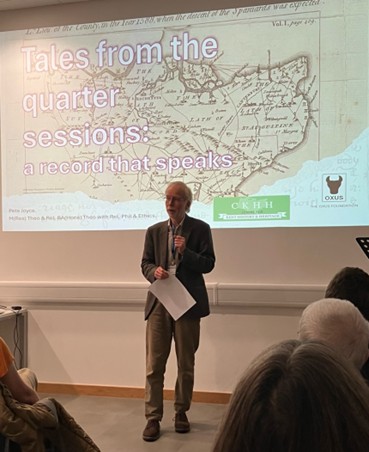
Pete introduced the Quarter Sessions as an archival document – a written record and a way in which the historian can understand the voices constructed in the document – in this case depositions, records of events and accusations of crime, though not the sentencing. He explains that there is a mass of documents from the Quarter sessions, and as a researcher he can examine slices of data to represent the nature and content of the Kent Quarter Sessions 1600-1700.
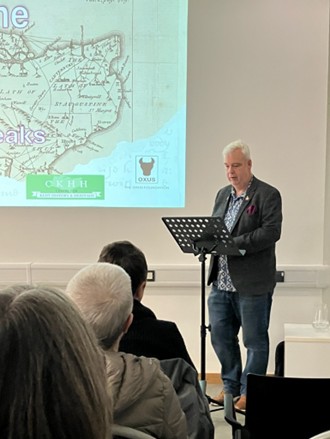
Pete’s presentation started with examples of an accusation of the theft of gold and silver, in short, an accused theft; he then moved to a focus on the bastard child and the trust of the midwife and matron that formed judicial comment on the status of the case premised on honesty rather than qualification; to examining the knowledge/power relations between servants, and masters. He was also keen to emphasise the evidence that women were subjected to the exercise of male power – forced into service and the most sexually vulnerable in society. Women had no rights and had no protection. The discourses of the depositions presented an unequal relationship between the rights of women and men – but also provided an understanding of the social structure of Kent as a pathway not only into studies of poverty, but also into the family unit, marriage patterns, and agricultural seasons. Pete’s presentation was very well received with questions from the audience addressed, and he provided fascinating clarity over the Quarter Sessions and the Justices of the Peace who brought their clerks to record the depositions as a record of what was said and by whom.
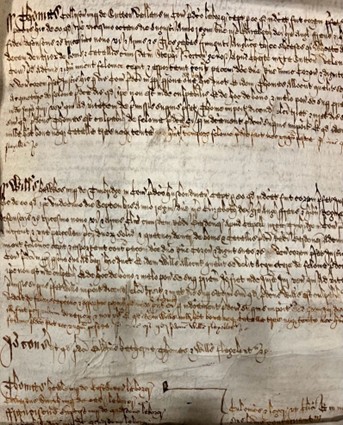
Pete summarised his research by re-stating the importance of these Quarter Sessions for the county of Kent, which left open questions for him – regarding the complexity of the research, and the pathways he could follow – the Quarter Sessions are an ‘imperfect factual list of the failings of one section of humanity as judged by another section of their contemporary but unequal society, quite often against a standard of ideals in which they had no part or voice in setting’.”
Now to the Centre’s next History Weekend which in 2025 will feature ‘Tudors & Stuarts’ and it will be held between Friday 25 April and Sunday 27 April, so please do save these dates and as soon as I have details on the website, including how to book, I’ll let you know. We’ll be back in CCCU’s Augustine House and the very popular CCCU Bookshop will again be in attendance, so thanks Craig, that’s excellent! For as well as bringing you some brilliant history talks, we hope to again raise funds for the Ian Coulson Postgraduate Fund.
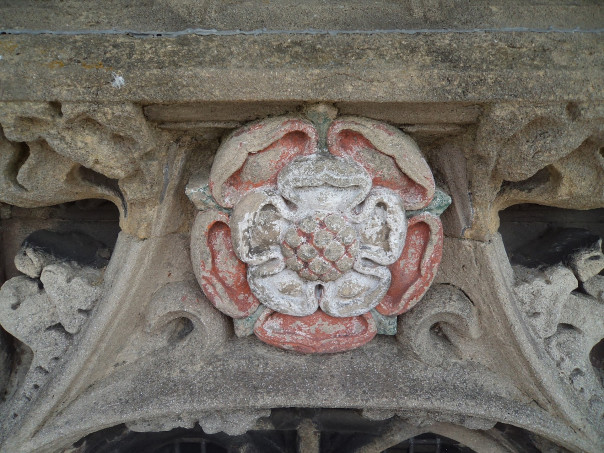
The opening lecture on the Friday will be given by Dr Alison Weir who will draw on her recent book ‘Mary I: Queen of Sorrows’. She will consider how Princess Mary, the adored only child of King Henry VIII and his first wife Katherine of Aragon, grew up initially as the sole heiress to the English throne, but because her father wanted a son soon Mary’s world began to fall apart. Thereafter, with her parents’ marriage – and England – in crisis, Mary is banished from the court and kept apart from the mother she adores. The King promises to restore her to favour, but first Mary must do something for which she will never forgive herself. She seeks solace in her faith. But when her brother Edward VI dies, she finds herself fighting for the crown – and for her very life. Emerging triumphant, all seems fair for the reign of Queen Mary. And then, very quickly, things began to go badly wrong…
Our closing lecture on Sunday afternoon will be given by Professor Emerita Jackie Eales, who is the President of the British Association for Local History and a past President of the Historical Association. She will be speaking on ‘Petitions, Spies and Sieges: The Fortunes of Women in the English Civil Wars’ and her talk will follow the fortunes of women in the 1640s as they petitioned both King and Parliament, defended their homes against plundering armies and undertook dangerous spying missions. From the Queen and the aristocracy to the fishwives of London, women were engaged at every level of society in the politics and fighting of the civil wars. As Jackie will discuss, in August 1643, after a year of warfare, the Royalist commander John Scudamore commented on the surprising intervention of London women in Westminster politics. While some petitioned for peace, others had turned to violence to end the war:
“the women against the House of Commons in multitudes … Mr. Pym beaten by the women and with much difficulty escaped their fury by water”.
The London trained bands killed some of the women during the tumult and just a few weeks earlier, Lady D’Aubigny had been arrested in London while hiding a commission from the King in her impressive beehive hairdo.
Scudamore used these examples to persuade Brilliana Harley to avoid bloodshed and surrender her Herefordshire home, Brampton Bryan Castle, to the King. In response, Brilliana refused all offers of leniency and endured a siege lasting seven weeks.
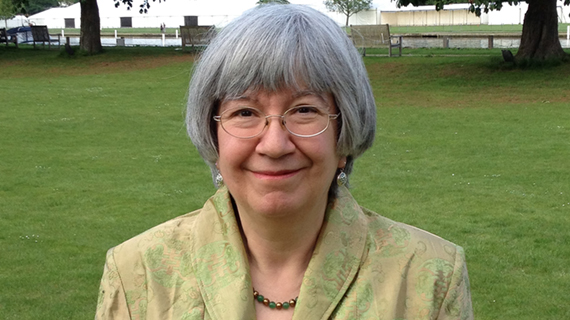
Other Tudor monarchs featuring at the Weekend will be Henry VII when Professor Steven Gunn considers Henry’s court. For as he says, Henry VII’s court is often overshadowed by those of his Tudor successors. His great palaces at Richmond and Greenwich are lost and he had no Holbein or Hilliard to paint his courtiers. Yet Steven’s lecture will argue that his court was a vital centre of politics, government and cultural change and that we cannot understand his reign without looking at his court.
Another aspect of Tudor royalty is the topic for Professor Anthony Musson whose presentation on Henry VIII’s royal progress will examine the role they played in creating networks and connecting the royal court with geographically widespread communities. Anthony will explore the difficulties and drawbacks as well as the positive aspects of royal journeys and engagement between monarch and people. He will also outline how, just as the progresses did so historically, so too in the present “Henry on Tour” is connecting communities and spreading the Historic Royal Palaces’ reach in its research remit and public engagement activities.
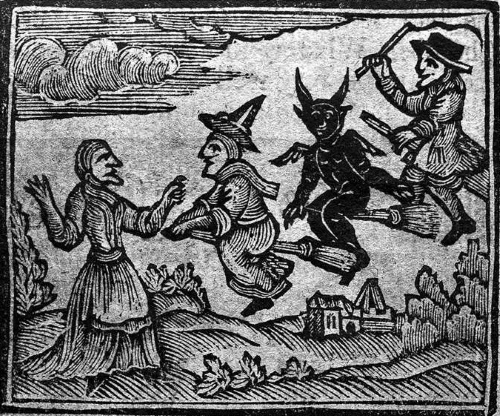
For those interested in other groups within early modern society, as Dr Rebecca Warren says, witchcraft in seventeenth century England has been the subject of countless stories and films but what was the reality behind the image? Her talk will investigate the sad case of six women accused of witchcraft, who stood trial at Maidstone Assizes in the 1650s, when Oliver Cromwell was Lord Protector. How did they come to be there? And what does their case tell us about the ‘witchcraft craze’ that swept through Britain in the sixteenth and seventeenth centuries? Starting with a single, local witchcraft trial, this talk looks at the wider political and social context of the proceedings, and exposes the way rumour, accusation, indictment and trial could engulf communities and destroy lives.
Looking further afield, Dr Chloe Ireton will draw on her recent book to discuss ‘Imagining Liberty: Slavery and Freedom in Black Thought in the early Spanish Atlantic’. For as she says, in the early modern era, millions of people were enslaved, dispossessed, and forcibly displaced from sites in West Africa and West-Central Africa to European imperial realms where the meanings of slavery and freedom were codified into distinct rules of law. These laws and traditions often differed from legal cultures about slavery in enslaved peoples’ places of origin or the sites where they or their ancestors were first enslaved. The talk traces how West Africans and West-Central Africans and their descendants reckoned with the violent world of Atlantic slavery that they were forced to inhabit, and how they conceptualized two strands of political and legal thought – freedom and slavery – in the early Spanish empire. In their daily lives, Black Africans and their descendants grappled with laws and theological discourses that legitimized the enslavement of Black people in the early modern Atlantic world and the varied meanings of freedom across legal jurisdictions. They discussed ideas about slavery and freedom with Black kin, friends, and associates in the sites where they lived and across vast distances, generating thick spheres of communication in the early modern Atlantic world. Discussions about freedom and its varied meanings moved from place to place through diverse exchanges of information, fractured memories, and knowledge between Black communities and kin across the Atlantic Ocean.
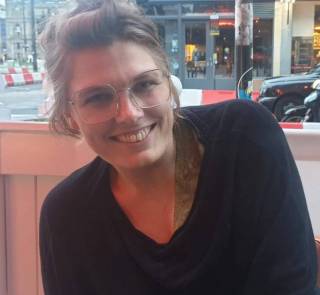
Finally, we will have our ever-popular tours and visits on Saturday morning, so please do look out for them when the History Weekend programme goes live.
 Centre for Kent History and Heritage
Centre for Kent History and Heritage Sheila Sweetinburgh
Sheila Sweetinburgh 1499
1499

